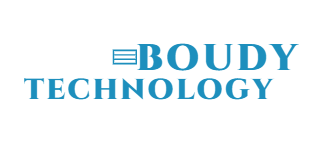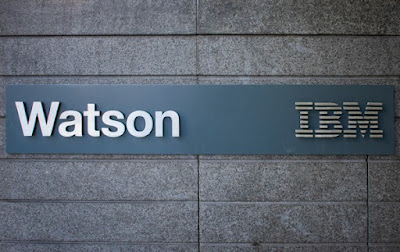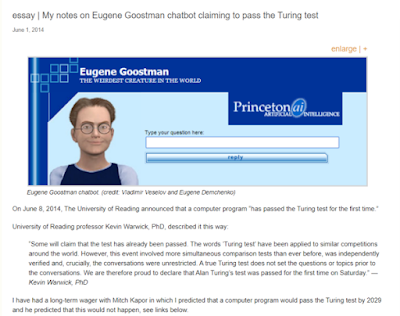5 artificial intelligence (AI) that surprised the world
Artificial intelligence (AI) is not a new technology. Although it is a technology field that has been steadily researched in the field of computer science since the 1950s, it has only failed to see the light of day due to the technological limitations of the time and the circumstances of the times.
Alan Tuning, who is called the father of computer science, presented the concept of AI through his thesis 'Computational Machines and Intelligence' published in 1950 and proposed the 'Turing Test' as a criterion for determining the intelligence of machines. Then, in 1956, the 'AI Conference' was held at Dartmouth University in the United States to lay the foundation for AI research.
Here are 5 AI that surprised the world in the 70-year-long AI research.
1. AI: Increased immersion with a simple algorithm… Psychological counseling program 'Eliza'
The 'eliza effect' refers to the phenomenon of subconsciously giving personalities to computers and AI by immersing in the human actions shown by computer programs or AI. This effect is a term derived from the case of 'Eliza', a simple psychological counseling chat program.
Eliza is a psychological counseling computer program developed in 1966 by Joseph Weisenbaum, a professor at Massachusetts Institute of Technology (MIT). am.
At that time, Professor Weisenbaum introduced Eliza as a professional psychological counselor and conducted a psychological counseling chat with a young woman. When the woman said, "My boyfriend made me come here," Eliza responded, "Your boyfriend made me come here." When the woman said, "My boyfriend says I'm depressed," she said, "I'm sorry you heard that she was depressed."
Eliza dealt with the subjects without any prior information, just by responding to them. The subject was immersed in the conversation without even knowing that he was talking to the machine. Weisenbaum's student and secretary, who knew that Eliza was a computer program, also fell into the conversation with Eliza and told the inside story.
At that time, the psychiatric community responded favorably by introducing Eliza to a psychiatric hospital to help with psychological treatment of mentally ill.
Professor Weisenbaum was shocked to see Eliza, implemented with rudimentary AI technology, tricking humans. Afterwards, he studied the fundamental characteristics of AI and computer technology and turned to critics of AI technology.
2.AI: Defeat the World Chess Champion...Chess Program 'Deep Blue'
'Deep Blue' is a chess game computer program developed by the American hardware company IBM. According to IBM, Deep Blue began in 1985 with a thesis by a graduate student. At that time, Xu Fengshiung, a graduate student at Carnegie Mellon, conducted his thesis project 'Chip Test' to study chess playing machines. In 1989, he was hired by IBM Labs to continue his research, creating an early model of Deep Blue.
Using this model, he played his first match against the then world chess champion, Garry Kasparov, in 1996. In this match, Deep Blue won his first round but went 2 draws and 3 losses in the following 5 matches.
Since then, IBM researchers have upgraded the program, such as improving Deep Blue's chess algorithm and learning Kasparov's notation in Deep Blue. A year later, IBM applied to Kasparov for a re-challenge, and the second match between Deep Blue and Kasparov was completed in 1997.
In this match, Deep Blue analyzed 200 million numbers per second, 70 million times faster than humans. They lost one game, but won the next two games to equalize. In the next 3 matches, they could not win, but in the last 6 matches, Deep Blue won 2 wins, 3 draws and 1 loss.
Immediately after the match, media reports that 'Humans were defeated by computers' spread all over the world, and this match served as an opportunity to inform many people about the existence of AI.
With the IBM100, IBM explained that "Deep Blue has had an impact on numerous computing industries" and "allows researchers to explore and understand the limitations of massively parallel processing."
3.AI: Winning the American TV quiz show 'Jeopardy'... Natural language AI 'Watson'
'Watson' is a natural language processing AI developed by IBM's DeepQA project.
In 2011, Watson competed in ABC's popular TV quiz show 'Jeopardy' and defeated the human quiz champion and won the most money ever.
In addition to Watson, Ken Jennings, winner of the Jeopardy Quiz Show 74 times in a row, and Brad Luthor, the biggest prize winner of all time, also participated in the show. In the quiz showdown that lasted for a total of three rounds, Watson won a prize of $77,140. Jennings and Luther only earned $24,000 and $21600, respectively.
Watson showed an unstable appearance in a few questions, but based on his vast knowledge, he outperformed the human performer and gave the correct answer faster than the human performer.
After Watson's quiz show victory, industry experts evaluated that the level of computers had reached the stage of finding the right answer by understanding human language beyond a computational tool.
"The hard part is deciphering the intent or determining the context," said Dan Old, analyst at Gabriel Consulting Group. "Now the computer understands the question and the context."
In March, IBM applied 'Advanced Sentiment Analysis' technology to Watson and developed it to a level that can interpret even English idioms and spoken expressions.
4. AI: The world's first AI to pass the Turing test... 'Eugene Gustman'
'Eugene Gustman' is an AI chatbot jointly developed by researchers in Russia and Ukraine. Described as a 13-year-old Ukrainian boy.
In 2014, Eugene Gustman was the world's first AI to pass the 'Turing Test', a criterion for determining AI that thinks like a human. According to the University of Reading announcement, Eugene Gustman passed the Turing test standard at the 'Turing Test 2014' held by the University of Reading's School of Systems Engineering and Roboto, a research institute for robot technology legal system funded by the European Union (EU).
The Turing test is a test that determines the ability of machines to think, and measures how similar the level of conversation between a machine and a human is. With a machine (A) as the test subject and a person (B) as a control sample, the judges use a computer to have a conversation with A and B, respectively. The judges do not know which one is the human. After the conversation, if more than 30% of the judges cannot distinguish people, both A and B are judged to have human-level thinking.
In this test, Eugene Gustman convinced more than 33% of the judges that he was a 'real human' after a five-minute text conversation.
"Eugene, who passed the Turing test, made a mark in computer history," said Kevin Warwick, a professor at the University of Reading.
But there are also skeptics about passing Eugene Gustman's Turing test.
Futurist Ray Kurzweil, author of 'The Singularity Is Coming', criticized Eugene for passing the Turing Test on his blog. He said, "The character of a 13-year-old boy, who is not his native English, is an effective constraint." He said, "A short time of 5 minutes can be deceived enough by an inexperienced judge."
According to Ray Kurzweil's conversation with Eugene, Eugene's answer is somewhat awkward or repeats the same words.
Gary Marcus, a cognitive scientist at New York University, argues that the Turing test needs to be updated for the 21st century. "Real AI should be able to watch TV shows or YouTube videos and answer related questions," he explains.
5. AI: Occupying Go with more cases than cosmic atoms... 'AlphaGo'
In March 2016, world Go champion Lee Sedol knelt in a match against Go AI 'AlphaGo'. In a total of 5 matches, Sedol Lee won only the 4th country and recorded 1 win and 4 losses.
Sedol Lee's loss was a big shock. Although Deep Blue defeated the world chess champion in 1997, Go requires a fairly fast and accurate computational power because the number of cases outweighs the number of atoms in the universe. As a result, most AI experts predicted Lee Se-dol's victory. However, contrary to expectations, when AlphaGo won the victory, many media reported that it was 'AI that made humans despair'.
AlphaGo is a Go game program developed by DeepMind, a subsidiary of Alphabet. According to the paper 'Mastering the Go Game with Deep Neural Network and Tree Search' published by co-authors such as Demis Hassabis, the founder of DeepMind in 2016, AlphaGo is a new search algorithm that combines 'Deep Neural Network (DNN)' and 'Monte Carlo Tree Search'. make use of
The DNN applied to AlphaGo consists of a 'Policy Network' and a 'Value Network'. The policy network predicts the number of follow-ups and narrows the search to find the number that is most likely to lead to victory. Value chains are used to reduce the depth of the search tree.
AlphaGo finds various numbers by playing simulation games with deep neural networks. In each simulation game, the policy network proposes intelligent play and the value chain evaluates the position reached. Through this process, AlphaGo sets the most ideal number.
The paper explained that AlphaGo, based on this algorithm, played against other Go programs and achieved a win rate of 99.8%.
AlphaGo has been upgraded over the years. The earliest version, AlphaGo Fan, AlphaGo Lee, and AlphaGo Master, came to AlphaGo, the final version of AlphaGo Zero.







Comments